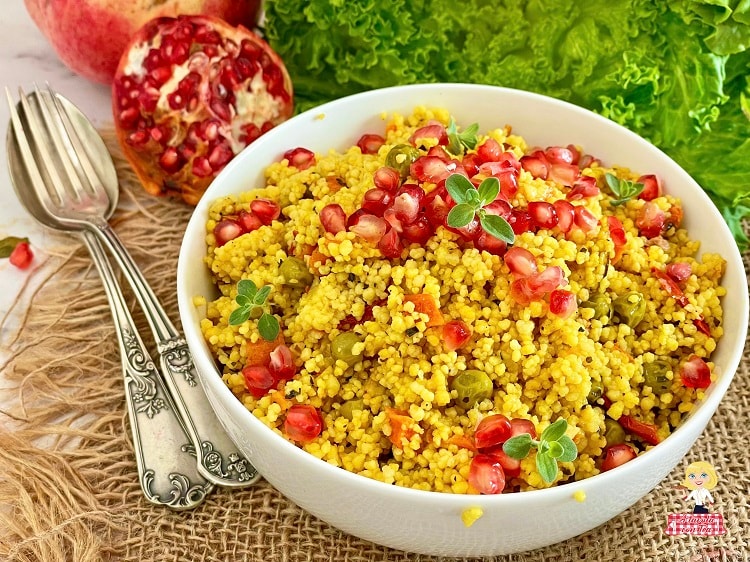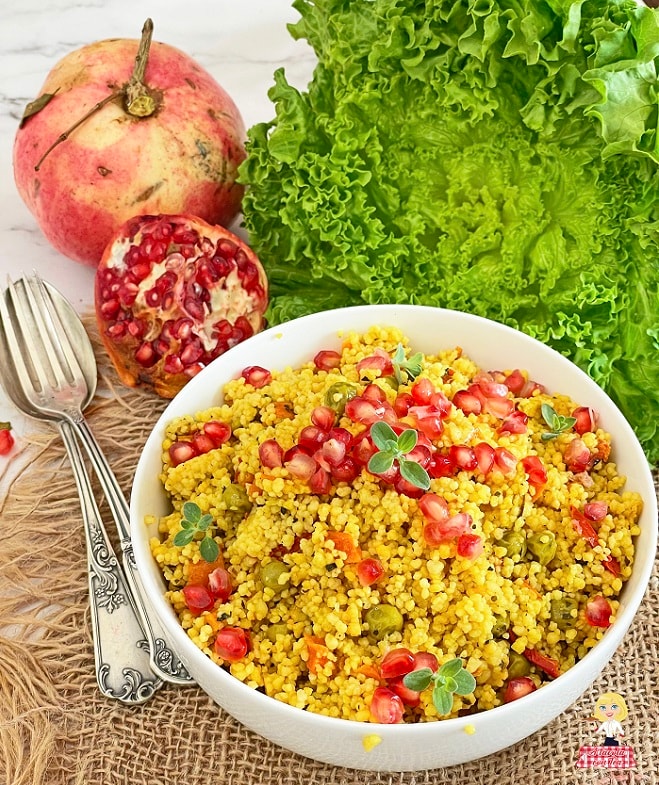CHRISTMAS Cous Cous with Pomegranate
A recipe with a slightly ethnic flavor perfect for the Christmas period, focusing on health and wellness for the numerous properties of the Pomegranate fruit.
The CHRISTMAS Cous Cous with Pomegranate will surprise you with its particular and delicious flavor, and besides being auspicious, it is also beautiful to present and will make you look great with very little effort.
I love couscous, a versatile ingredient that easily pairs with meat, fish, or even just vegetables, but above all, it’s very quick to prepare, provided you use the precooked kind.
You just need to soak it in boiling water, and it’s ready in 5 minutes, perfect for when you’re in a hurry and maybe don’t feel like spending too much time cooking, but still want to eat a tasty, healthy, and balanced dish.
In today’s version (CHRISTMAS Cous Cous with Pomegranate seeds), we’ll prepare it in a simple way without proteins, which can be served as a side dish to a meat or fish dish or even eaten as a standalone vegetarian dish. What makes it special in appearance and taste are these wonderful red pomegranate seeds that give it an extra touch.
If this year you want to surprise your guests and prepare an original dish for the holiday menu, try the Cous Cous with Pomegranate and you won’t be disappointed.
Also try these recipes

- Difficulty: Very easy
- Cost: Cheap
- Rest time: 30 Minutes
- Preparation time: 15 Minutes
- Cooking time: 5 Minutes
- Portions: 4
- Cuisine: Moroccan
- Energy 265.19 (Kcal)
- Carbohydrates 36.23 (g) of which sugars 5.50 (g)
- Proteins 7.40 (g)
- Fat 11.47 (g) of which saturated 1.52 (g)of which unsaturated 3.44 (g)
- Fibers 4.05 (g)
- Sodium 213.64 (mg)
Indicative values for a portion of 80 g processed in an automated way starting from the nutritional information available on the CREA* and FoodData Central** databases. It is not food and / or nutritional advice.
* CREATES Food and Nutrition Research Center: https://www.crea.gov.it/alimenti-e-nutrizione https://www.alimentinutrizione.it ** U.S. Department of Agriculture, Agricultural Research Service. FoodData Central, 2019. https://fdc.nal.usda.gov
Ingredients
- 7.1 oz raw couscous (precooked)
- 3/4 cup water (boiling)
- 1 tbsp turmeric powder
- to taste salt
- 1 onion
- 2 tbsps extra virgin olive oil
- 1 pomegranate
- 2 tbsps toasted pistachios
Tools
- Bowl
- Cling film
- Pan
Steps
Pour the precooked couscous into a large bowl, season with 1 tablespoon of extra virgin olive oil, a pinch of salt, and the turmeric, and mix everything with a spoon. Then cover with hot water, seal with plastic wrap, and let it rest for about 5 minutes (check the times indicated on the package as they may be longer).
After the time has passed, transfer the couscous to a large plate or tray and fluff it carefully with a fork.
In the meantime, obtain the pomegranate seeds (how to open and extract pomegranate seeds), collect them in a dish, and let them drain of any liquid, dry them well with paper towels to remove any excess liquid.
Heat 2 tablespoons of extra virgin olive oil in a large pan, add the chopped onion and let it sauté until it becomes almost transparent.
Add the chopped pistachios and the fluffed couscous and mix everything. Taste and adjust the salt if necessary. Turn off the heat, transfer everything to a bowl, add the pomegranate seeds, a drizzle of oil, and mix again. Serve immediately as an accompaniment to a meat or fish dish or as a standalone vegetarian dish.

NOTES
You can, following the same recipe, replace the Cous Cous with Bulgur.
To turn this recipe into a main dish, you can add grilled chicken or shellfish.
STORAGE
Once ready, the Cous Cous with Pomegranate can be stored in the refrigerator in an airtight container for up to 2 days. This recipe is not suitable for freezing.
FAQ (Frequently Asked Questions)
Is couscous a carbohydrate?
Yes, couscous is a source of complex carbohydrates and its glycemic index is very similar to that of pasta. However, the ‘absorption’ cooking method of couscous, which uses a glass of water for each glass of product, helps contain starch gelatinization.
Can someone on a diet eat couscous?
Yes, someone on a diet can eat couscous because it is a light and low-calorie food that easily fits into a traditional diet. With its 350 kcal per 100 g of product, it has about half the calories of durum wheat pasta and rice.
What is the history and origin of Cous Cous, and what are the varieties of Cous Cous?
Discover the origins of Cous Cous and all the varieties that exist.

